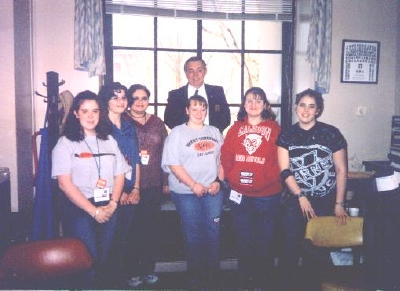SCAT-RAZE NEWS

RAZE members meet with Delegate Bill Stemple
SCAT-RAZE MEMBERS ATTEND LEGISLATURE
By Carlene Frederick
Six students from the Calhoun SCAT-RAZE group joined the American Cancer Society for their annual WV Lobby Day on February 19, 2004.
While there the students performed two "Commotions," anti-tobacco demonstrations for the Society, "Make Your Own Dip," and "1 In 5."
The students had a chance to learn more about legislative issues, meet with their representatives, Bill Stemple and Jeff Kessler, tour the Capitol and view the Legislature in session.
Those attending were, Debby White, Beth Richards, Eva Richards, Tiffany Swisher, Amber Miller and Lauren Myers, Chaperones were, Carlene Frederick and Jenny Richards.
SCAT-RAZE MEMBERS ATTEND RESA V MINI RAZE
By Amber Miller
Calhoun SCAT-RAZE members attended the First Annual RESA V Mini RAZE-ON at WVU-Parkersburg, on February 28.
RAZE is the West Virginia Youth Anti-Tobacco Movement.
Calhoun RAZE members joined others from Wirt, Wood, Jackson, Ritchie, Pleasants and Roane Counties. The day was full of workshops, ice-breakers, and other fun group activities, such as "Commotion's."
Workshops taught by trained RAZE members, included, Tobacco 101, Icebreakers, Activism, and posting and evaluating "Commotions" on the RAZE web site.
"Commotions" performed by the group involved a graffiti wall on which students wrote messages to "Big Tobacco", a Banner Run which read, "Tobacco kills more people than Aids, car accidents, illegal drugs, murder and suicide, combined."
Members also participated in a cigarette butt clean-up around the WVU-P campus. The final "Commotion," was a Pledge Wall where members pledged to help someone stop using tobacco, or encourage them not to start.
Members attending from Calhoun County were, Amber Miller, Beth Richards, Eva Richards, Jenny Richards and Carlene Frederick, RAZE Coordinator.
AN OPEN LETTER
By Carlene Frederick
Working with tobacco prevention for 10 years, I have learned valuable information about the dangers of tobacco use. Perhaps others will benefit if I share some of the information and maybe help someone avoid the harmful effects of tobacco use.
Although I never smoked, over the years I have been exposed to secondhand smoke as a child and on the job. Before the clean indoor air regulations were issued, people could smoke anywhere, anytime, and they did, not knowing the dangers of secondhand smoke. Through education we now know secondhand smoke is very dangerous and poses a particular threat to children.
I try to avoid exposure to secondhand smoke because of lung damage from exposure, which sometimes causes an asthma attack. The clean indoor regulations makes it easier to avoid secondhand smoke., but unfortunately not all businesses have a smoke-free environment. I really appreciate the businesses that adhere to the regulations. It is wonderful for those of us that must avoid secondhand smoke, to be able to go into a place to conduct business and breathe clean indoor air.
Secondhand smoke is a major cause of heart disease, stroke, respiratory disease, lung cancer and many other illnesses. Just 30 minutes of exposure produces some of the physical reactions that would occur from long-term smoking, and increases the risk of heart disease. Secondhand smoke contains 4,000 chemicals and over 40 of those chemicals have been proven to cause cancer. The concentration of these carcinogenic chemicals is actually higher in secondhand smoke than in fumes inhaled directly by smokers.
Secondhand smoke causes 3,000 lung cancer deaths each year among non smokers in the US. The number of cancer deaths caused by secondhand smoke is higher than the total of cancer deaths caused by asbestos, radionuclides, arsenic, benzene, vinyl chloride, radiation, pesticides, hazardous waste sites, chemicals found in drinking water, industrial chemicals, contaminated sludge, and mining waste combined.
Children are especially vulnerable. Secondhand smoke increases low birth-weight deliveries among non-smoking women. It can also damage lung functions in children, and greatly increases the risk of Sudden Infant death Syndrome (SIDS). Each year nationally secondhand smoke causes 26,000 new cases of asthma, 2.2 million ear infections, 150,000 to 300,000 cases of lower respiratory tract infections and up to 2,500 deaths from SIDS and kills more than 65,000 people each year in the US.
West Virginia now has 49 locally-enforced clean indoor air regulations protecting over 90 percent of our population.
If you are a smoker, please be aware of those around you and don;t expose others to secondhand smoke, especially children. Make sure you know the facts on secondhand smoke!